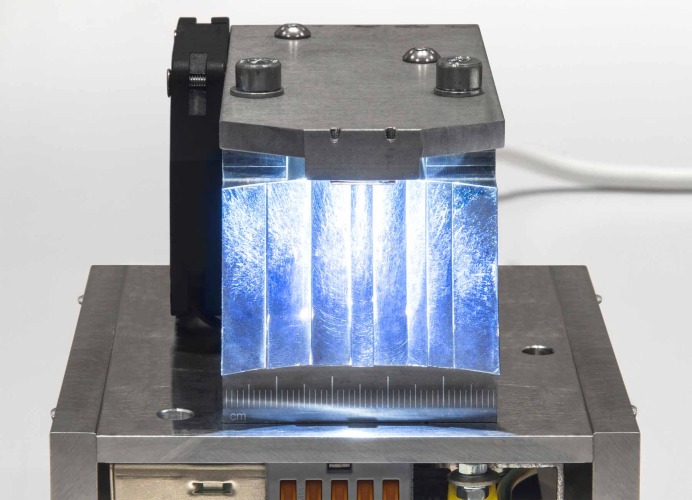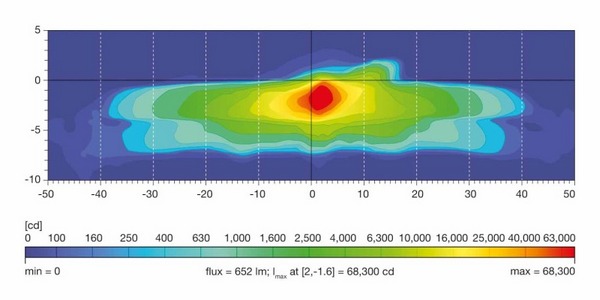Experts at Osram Opto Semiconductors will be taking the opportunity offered by the Vision Congress in Paris (October 14 and 15, 2014) to showcase an LED for car headlights which has a luminance three times that of existing versions. This means that a single LED can be used to provide a complete low beam. Several LED chips have always been needed in the past depending on the design and the type of LEDs used. The tremendous brightness is the result of a combination of UX:3 chip technology, ceramic conversion technology and high-current technology used in projection applications. In future it will be possible to design much smaller headlights – with every lighting function smaller than a box of matches.
 |
|
Every headlight function smaller than a box of matches. This could soon be reality thanks to the new LED prototypes from Osram Opto Semiconductors. (Photo Credit: Osram) |
A low beam unit measuring only 30 mm x 50 mm generating a phenomenal 1400 lumen from a single LED chip as its light source could be reality in only a few years time thanks to an LED developed by Osram experts. At 200 megacandelas per m², this LED has three times the luminance of existing light emitting diodes for these applications and loses less than ten percent of its intensity even at high operating temperatures of 85°C.
"In developing the LED we applied our extensive experience in projection applications to combine the high-current technology used in such applications with UX:3 chip technology and ceramic conversion technology which is standard practice for white headlight LEDs“, said Stefan Grötsch, Senior Key Expert at Osram Opto Semiconductors. Even the special mounting technology based on the Osram Ostar platform was transferred from projection to this automotive application. This involvessoldering the chip directly to the copper. The large amounts of heat produced as a result of the high output can be dissipated much more easily, which in turn greatly improves the thermal connection.
 |
|
A single LED for low beam. The distribution of light under laboratory conditions indicates that the relevant standards will be met. (Image Credit: Osram) |
The path to series production
The high brightness values were measured in the laboratory but they should be achieved soon also by series production LEDs. The results of research and development work will be gradually flowing into product development at Osram Opto Semiconductors next year. Together with the use of laser technology which produces very high luminance, a series LED could lead to extremely compact headlight solutions, expanding the Osram product portfolio in this sector. It is conceivable, for example, that headlights will become ultra-compact, comprising a laser high beam and LED low beam, and that other automotive applications such as interior lighting and new types of head-up display will follow. These displays will project important information directly onto the windshield, such as video of the area directly in front of the car, or navigation instructions, and will be much more vivid and graphic than is the case with existing systems. They will therefore be classed as "augmented reality" displays because they enrich the viewing experience with additional information and therefore create a fresh impression of reality.
LED prototype in the laboratory
Description: Every headlight function smaller than a box of matches. This could soon be reality thanks to the new LED prototypes from Osram Opto Semiconductors.
Source: Osram
Light distribution for LED low beam
Description: A single LED for low beam. The distribution of light under laboratory conditions indicates that the relevant standards will be met.













